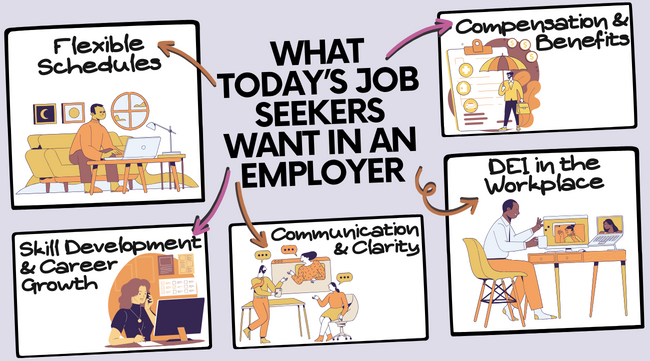While the core elements of what employees seek in a job remain relatively consistent over time, there can be shifts in priorities and expectations based on evolving workplace trends and societal changes. Here are some of the most important factors employees will consider in 2024 when deciding whether to stay in their current job or pursue a new opportunity.
Flexible schedules: The desire for flexible work arrangements, whether remote or hybrid or working non-traditional hours, will likely continue to grow. More than ever, employees are placing an increased value on the importance of work-life balance and are prioritizing their families and personal lives. According to a poll by Gitnux, 61% of employees have left, or considered leaving, their jobs because of a lack of flexibility. Additionally, “76% of workers would be more willing to stay with their current employer if they had flexible work options.” Offering a flexible work schedule will continue to be essential to every organization’s ability to attract and retain top talent.
Skill Development & Career Growth: Millennials and Gen Zers now make up a majority of the workforce, and they are not inclined to accept a job or stay in a position that does not offer a clear path for professional development and career advancement. It is imperative that employers are offering jobs that will satisfy their employee’s need for growth. Employees desire to be challenged and want to improve. Management must focus on their employees’ development needs and ensure they are upskilling and reskilling wherever and whenever possible.
Clarity & Communication: Employees increasingly value finding meaning in their work and being part of a company that values their efforts. Employees desire clarity regarding their roles and responsibilities. They want consistency in communication and an organizational structure that allows them to do their jobs efficiently and contribute meaningfully to the organization. If they understand what is expected of them, are shown respect, and are rewarded and recognized for their efforts, they will perform better and stay longer.
DEI in the Workplace: Diversity, equity, and inclusion (DEI) have become primary concerns for employees and employers alike. Employees want to work for a company committed to fostering an inclusive workplace where people of all backgrounds feel welcomed and respected and have equal opportunities for success. They want to work in a dynamic and engaging environment. Diversity can increase innovation, creativity, and strategy because groups of people from different backgrounds can draw upon their unique experiences and a wider range of knowledge to tackle challenges and experience success.
Compensation & Benefits: Last but most certainly not least, it is no surprise that pay and benefits remain one of the leading reasons why someone accepts or leaves a job. According to LinkedIn, workers who did not see a pay raise are more likely to start looking for a new job. Additionally, a robust and comprehensive benefits package is a must to attract and retain top talent. Supporting physical and mental health and offering benefits that align with this mission is becoming increasingly important. Research shows that 92% of workers believe it is essential that an organization values their emotional and psychological well-being. Employees are prioritizing their mental health, and because stress can impact employee performance and productivity, offering employees mental health benefits is essential.
These factors collectively contribute to employees’ overall job satisfaction and engagement, influencing their decision to join, stay, or leave an organization. Employers that understand and prioritize these aspects can better attract and retain top talent in 2024 and beyond.
Looking for more ways your organization can succeed? Subscribe to The JOHNLEONARD Blog!


